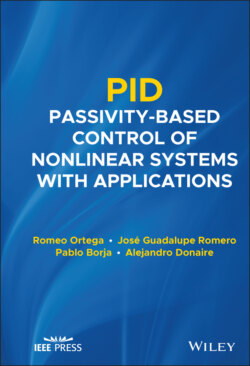Читать книгу PID Passivity-Based Control of Nonlinear Systems with Applications - Romeo Ortega - Страница 11
Author Biographies
ОглавлениеRomeo Ortega was born in Mexico. He obtained his BSc in Electrical and Mechanical Engineering from the National University of Mexico, Master of Engineering from Polytechnical Institute of Leningrad, USSR, and the Docteur D‘Etat from the Polytechnical Institute of Grenoble, France in 1974, 1978 and 1984 respectively.
He then joined the National University of Mexico, where he worked until 1989. He was a Visiting Professor at the University of Illinois in 1987–1988 and at McGill University in 1991–1992, and a Fellow of the Japan Society for Promotion of Science in 1990–1991. He was a member of the French National Research Council (CNRS) from June 1992 to July 2020, where he was a “Directeur de Recherche” in the Laboratoire de Signaux et Systemes (CentraleSupelec) in Gif‐sur‐Yvette, France. Currently, he is a full time Professor at ITAM in Mexico. His research interests are in the fields of nonlinear and adaptive control, with special emphasis on applications.
He has published five books and more than 350 scientific papers in international journals, with an h‐index of 84. He has supervised more than 35 PhD thesis. He is a Fellow Member of the IEEE since 1999 (Life 2020) and an IFAC Fellow since 2016. He has served as chairman in several IFAC and IEEE committees and participated in various editorial boards of international journals. He is currently Editor in Chief of International Journal of Adaptive Control and Signal Processing and Senior Editor of Asian Journal of Control.
José Guadalupe Romero was born in Tlaxcala, Mexico in 1983. He received the BS degree in electronic engineering from the University of Zacatecas, Zacatecas, Mexico, in 2006 and the MSc degree in robotics and advanced manufacturing from the Centre for Research and Advanced Studies, National Polytechnic Institute (CINVESTAV), Mexico, in 2009. He obtained the PhD degree in Control Theory from the University of Paris‐Sud XI, France in 2013.
He was a postdoctoral fellow at Schneider electric and EECI in Paris France and at the Laboratoire d'Informatique, de Robotique et de Microélectronique de Montpellier (LIRMM) in 2014 and 2015, respectively. Currently, he is an associate professor and researcher at the Digital Systems Department at the Instituto Tecnológico Autónomo de México (ITAM) and since 2019 he is the Director of undergraduate mechatronics engineering program.
His research interests are focused on nonlinear and adaptive control, stability analysis and the state estimation problem, with application to mechanical systems, aerial vehicles, mobile robots and multi‐agent systems.
Pablo Borja was born in Mexico City, Mexico. He obtained the B.Eng. in Electrical and Electronic Engineering and the M.Eng. from the National Autonomous University of Mexico in 2011 and 2014, respectively, and the PhD in Control Systems from the University Paris Saclay, France, in 2017.
From 2017 to 2018, he was a postdoctoral researcher member of the Engineering and Technology Institute Groningen (ENTEG) at the University of Groningen (RUG). Since 2018 he is a fellow of the Faculty of Science and Engineering and ENTEG member at the RUG. His research interests encompass the control and analysis of nonlinear systems, passivity‐based control, control of physical systems, passivity and its role in control theory, and model reduction.
Alejandro Donaire received the Electronic Engineering and PhD degrees in 2003 and 2009, respectively, from the National University of Rosario, Argentina. His work was supported by the Argentine National Council of Scientific and Technical Research, CONICET. In 2009, he joined the Centre for Complex Dynamic Systems and Control at The University of Newcastle, Australia, and in 2011, he received the Postdoctoral Research Fellowship of the University of Newcastle, Australia. From 2015 to March 2017 he was with the PRISMA Lab at the University of Naples Federico II, and from 2017 to 2019 with the Institute for Future Environments, School of Electrical Engineering and Computer Science, Queensland University of Technology, Australia. In 2019, he joined the School of Engineering, The University of Newcastle, Australia, where he conducts his academic activities. His research interests include nonlinear and energy‐based control theory with application to electrical drives, multi‐agent systems, robotics, smart micro‐grids networks, marine and aerospace mechatronics, and power systems.
